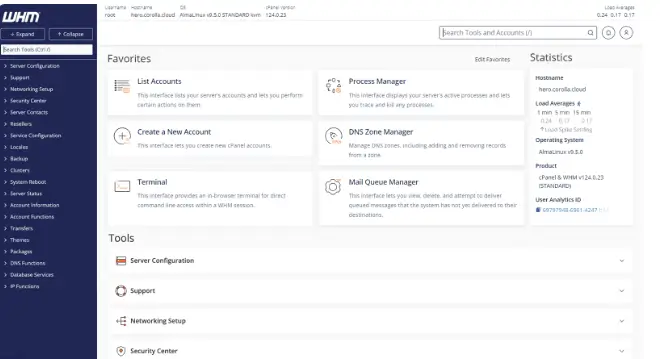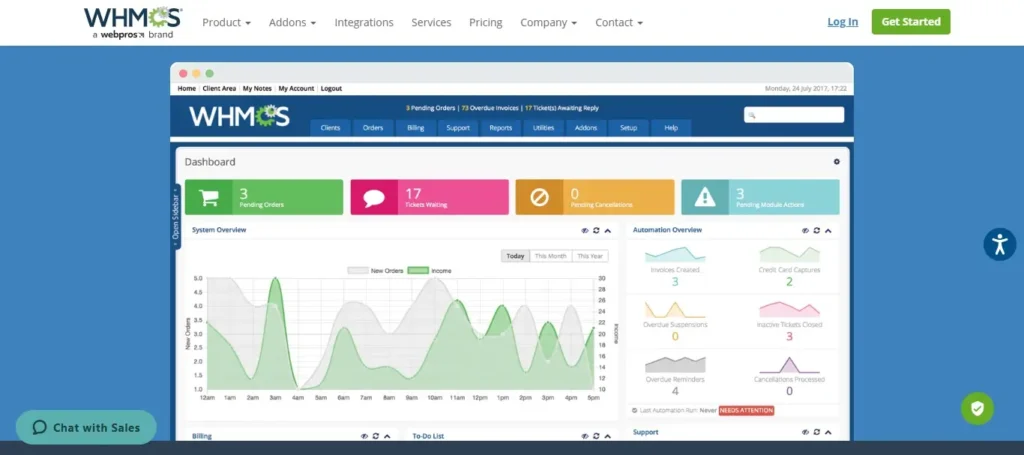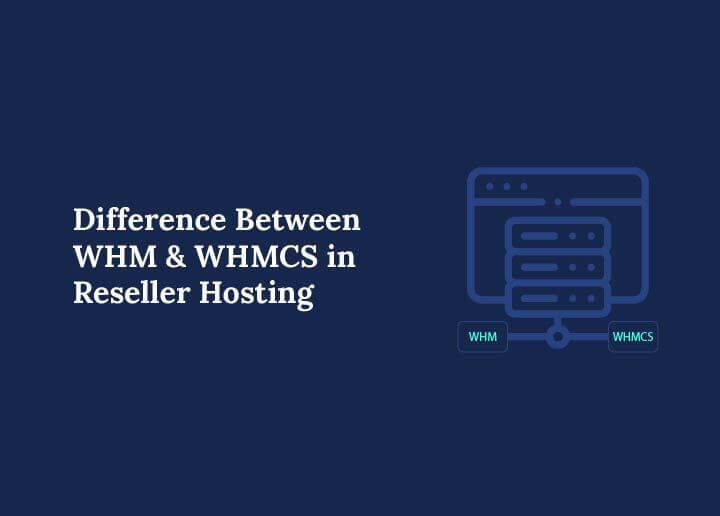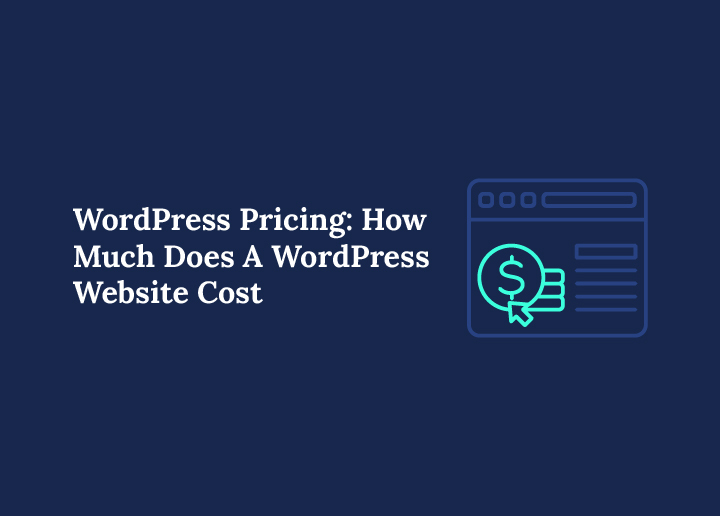If you are starting your reseller hosting business, you will quickly come across two important terms: WHM and WHMCS. At first, they may sound similar. In fact, many beginners confuse them or think they are the same thing. But they serve different purposes.
Understanding the difference between WHM and WHMCS can help you run your hosting business more efficiently. This article will guide you through both tools, explain how they work, and show you why you might need both.
What is Reseller Hosting?
Reseller hosting is a type of web hosting where you rent server space from a hosting provider and then resell it to your own clients.
Think of it like leasing a big house (server) and renting out each room (hosting account) to different people. As a reseller, you can:
- Create custom hosting packages.
- Set your own prices.
- Offer branded hosting services under your own business name.
For example, imagine you buy a reseller hosting plan with space for 50 websites. You could divide that into 50 small accounts for different clients, or create fewer accounts with more resources each.
To manage all of this, you need tools, and that’s where WHM and WHMCS come in.
What is WHM?
WHM, short for Web Host Manager, is a control panel that lets you manage multiple cPanel accounts from one place.

While cPanel is for end-users (your customers), WHM is for resellers and server administrators. With WHM, you can:
- Create, edit, and delete cPanel accounts.
- Set resource limits (disk space, bandwidth, email accounts).
- Create hosting packages.
- Monitor server status.
- Customize cPanel for branding.
Example: Let’s say you have 10 clients. Each needs its own separate hosting account. Instead of manually setting up each one, you can log into WHM, create a hosting package with the exact limits you want, and then generate accounts in just a few clicks.
In short: WHM is your control panel for managing hosting accounts.
Read: Master Reseller Hosting with the Best Reseller Platforms
Key Features of WHM for Reseller Hosting
Web Host Manager (WHM) is designed to give resellers complete authority over their hosting environment. It offers a range of tools that simplify account management, resource allocation, branding, and security. Let’s explore its key features.
Account Management
First and foremost, WHM allows you to create, modify, or suspend cPanel accounts with ease. This means you can quickly onboard new clients, update existing account settings, or disable accounts when necessary. It gives you full flexibility to handle each client’s requirements.
Hosting Packages
With WHM, you can set up different hosting plans tailored to your business model. You can define disk space, bandwidth, and email limits for each package. This makes it easy to offer multiple pricing tiers and cater to different customer needs.
Branding Options
Branding is vital in reseller hosting. WHM enables you to customize the cPanel interface with your logo, business name, and preferred color schemes. As a result, your clients see your brand every time they log in, helping you build credibility.
Resource Monitoring
To ensure smooth performance, WHM provides real-time resource monitoring. You can track CPU usage, bandwidth consumption, and disk space across all accounts. This helps you identify issues early and optimize server resources.
Security Controls
Lastly, WHM provides robust security settings. You can enforce password policies, manage SSL certificates, and control account access, which ensures your clients’ websites stay safe and secure.
Simply put, WHM equips resellers with the tools needed to manage hosting accounts effectively while maintaining a professional and branded service.
Check out: Best Reseller Hosting in Canada
What is WHMCS?
WHMCS stands for Web Host Manager Complete Solution. Despite the name, it is not the same as WHM.

WHMCS is an automation platform that helps you run the business side of hosting. With WHMCS, you can:
- Automate billing and invoicing.
- Handle new account orders automatically.
- Manage domain registrations.
- Offer customer support through a ticketing system.
- Integrate with payment gateways like PayPal or Stripe.
Example: If a customer visits your website and signs up for a hosting package, WHMCS can automatically:
- Take the payment.
- Create their hosting account in WHM.
- Send them a welcome email with login details.
This saves you from doing all those steps manually, especially when you start getting more clients.
In short: WHMCS is your business automation and client management tool.
Know more: VPS Reseller Hosting
Key Features of WHMCS for Reseller Hosting
Web Host Manager Complete Solution (WHMCS) is designed to automate and streamline these tasks. It acts as the central hub for your business operations, helping you save time and deliver a smooth client experience. Let’s look at its key features.
Automated Billing
WHMCS allows you to send invoices automatically and process payments without manual intervention. You can also set up recurring billing, accept payments through multiple gateways, and send payment reminders. This ensures consistent cash flow and accurate billing for your clients.
Client Management
With WHMCS, you can store and manage client details in one place. It records order history, keeps communication logs, and lets you access customer information quickly. This makes it easy to provide personalized support and maintain a professional relationship with clients.
Domain Management
WHMCS simplifies domain registration, transfers, and renewals for your customers. You can offer domains alongside hosting packages, integrate with registrars, and let clients manage their domains directly from the client portal.
Support System
It comes with a built-in ticketing system so clients can raise support requests directly. You can assign tickets, track issues, and respond promptly, ensuring high-quality customer service.
Third-Party Integrations
WHMCS connects seamlessly with registrars, control panels, and payment gateways. This allows you to automate almost every aspect of your hosting business, from provisioning accounts to processing renewals.
Simply put, WHMCS brings together automation, management, and support, allowing resellers to focus on growth rather than routine tasks.
Read about: Best Reseller Hosting in Dubai
WHM vs WHMCS: The Core Difference
Here’s a quick summary table that lists the key features of both these platforms.
| Feature / Purpose | WHM (Web Host Manager) | WHMCS (Web Host Manager Complete Solution) |
| Primary Role | Hosting account management | Business management & automation |
| Main Function | Create, edit, and manage cPanel accounts | Automate billing, payments, and client management |
| Target User | Resellers and server administrators | Resellers and hosting business owners |
| Key Tools | Account creation, hosting package setup, server control | Invoicing, payment gateways, domain management, support desk |
| Automation Level | Limited (manual setup unless integrated) | High (automates order processing, account setup, renewals) |
| Branding Options | Customize cPanel with logos and themes | Customize client portal, emails, and invoices |
| Integration | Works with cPanel for account control | Integrates with WHM, domain registrars, and payment systems |
| Example Use | Create a hosting package with 10GB storage and assign it to a client | Client orders the 10GB package online, pays, and receives account details automatically |
| Best Use Case | Technical backend control | Frontend business operations and customer handling |
Why You Need Both in Reseller Hosting
If you are just starting out, you might wonder: “Can I run my business with only one of them?” Technically, yes. But it would be inefficient.
- If you use only WHM, you will need to manually track payments, issue invoices, and create accounts. This is fine for 1 or 2 clients, but it gets messy as you grow.
- If you use only WHMCS, you can automate sales, but you still need WHM (or another control panel) to actually create and manage the hosting accounts.
Together, they create a complete solution:
- WHM handles the hosting side.
- WHMCS handles the business side.
Explore: Top cPanel Alternative Hosting Platform
How WHM and WHMCS Work Together?
While WHM and WHMCS have different functions, they are most powerful when used together. For a reseller hosting business, combining them creates a seamless and fully automated workflow, from package creation to payment processing and account delivery.
This integration reduces manual work, speeds up onboarding, and ensures a smooth experience for both you and your clients. Let’s break down how they work side by side.
Setting Up Hosting Packages in WHM
The process begins in WHM, where you create the hosting packages you want to sell. These packages define limits such as disk space, bandwidth, and email accounts. This is the technical foundation of your hosting service.
Connecting WHM to WHMCS
Next, you integrate WHM with WHMCS. This link allows WHMCS to communicate directly with WHM. Once connected, WHMCS can automatically provision accounts without you needing to log into WHM every time.
Customer Purchases a Hosting Plan
A customer visits your WHMCS-powered website and selects a hosting package. They complete their order through the checkout system you have set up in WHMCS.
WHMCS Processes Payment and Triggers Account Creation
As soon as payment is confirmed, WHMCS sends a request to WHM to create the new hosting account. This happens instantly, without any manual steps from you.
Customer Receives Login Details
Finally, WHMCS automatically sends a welcome email to the customer. This email contains their cPanel login details, allowing them to start using their hosting service right away.
Discover: Guide to Offshore Reseller Hosting
Advantages of Using WHM and WHMCS Together
Efficiency and customer satisfaction are key to growth for reseller hosting businesses. When WHM and WHMCS work together, they create a streamlined, automated system that benefits both the business owner and the client.
This integration reduces manual work, speeds up processes, and improves overall service quality. Here are the main advantages.
- Saves Time: Automating account creation and billing eliminates repetitive tasks. You no longer need to set up hosting accounts or send invoices manually. WHMCS and WHM handle these steps instantly.
- Scales Easily: As your business grows, you can add more customers without increasing your workload. The automation ensures each new order is processed in the same efficient way, whether you have 10 clients or 200.
- Reduces Errors: Manual processes can lead to account details or billing mistakes. Automation through WHMCS ensures that all information is accurate and consistent, reducing the risk of costly errors.
- Improves Customer Experience: Clients can sign up and start using their hosting at any time, even outside business hours. This convenience builds trust and increases customer satisfaction.
Also read: Best Reseller Hosting Providers in USA
Common Misconceptions About WHM and WHMCS
Because WHM and WHMCS are often mentioned together, beginners in reseller hosting sometimes misunderstand their relationship. These misconceptions can lead to confusion and missed opportunities for business efficiency. Let’s clear up the most common myths.
- They Are the Same Thing: This is false. WHM and WHMCS have different roles. WHM manages hosting accounts on the server side, while WHMCS handles the business side, including billing and client management.
- WHMCS Is Part of WHM: Not exactly. WHMCS is a separate software application that integrates with WHM. While they work closely together, each can technically operate on its own, though they deliver the best results when used in combination.
- I Don’t Need WHMCS If I Have a Small Business: You might not require WHMCS immediately if you only have a handful of clients. However, as your customer base grows, manual processes become time-consuming. WHMCS automation can save you hours of work and prevent errors, making it invaluable for scaling your business.
Conclusion
For anyone starting in reseller hosting, knowing the difference between WHM and WHMCS is essential.
- WHM is your technical control panel for managing hosting accounts.
- WHMCS is your business automation tool for billing, support, and domain management.
When used together, they create a seamless system that saves time, reduces errors, and allows your hosting business to grow without adding more work.
If you’re serious about reselling hosting, investing in both will make your journey smoother and more profitable.
FAQs About WHM and WHMCS
What is the difference between WHM and WHMCS?
WHM and WHMCS are two completely separate products used by web hosting companies. WHM is a web hosting control panel for managing hosting accounts, server settings, and branding purposes. WHMCS is a business automation platform that handles the billing and invoicing process, support tickets, and domain registration system. They work together but are developed by different companies.
What does WHM stand for in hosting?
WHM stands for Web Host Manager. It allows web hosting providers and web developers to create and manage hosting accounts, configure cpanel server settings, and manage hosting packages. WHM is installed on web hosting servers or a new server to control customer accounts from a single interface.
What is WHMCS in cPanel?
In a web hosting business, WHMCS is third party software that integrates with WHM to automate the invoicing process, billing services, support ticketing system, and popular payment gateways. It provides automation tools and a user friendly interface for managing customer accounts and support tickets.
What does WHMCS stand for?
WHMCS stands for Web Host Manager Complete Solution. It is used by web hosting companies to streamline billing, handle domain registration systems, and manage support tickets.
Are WHM and WHMCS the same?
No, WHM and WHMCS are completely separate products and independent products. WHM focuses on web hosting management and technical control, while WHMCS handles the automated functionality of a web hosting company, such as the WHMCS installation process, WHMCS interface, and software packages for the business side.



